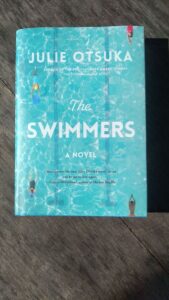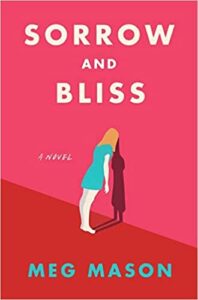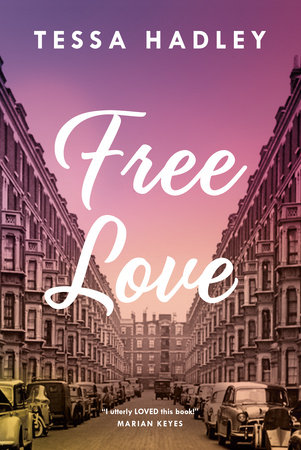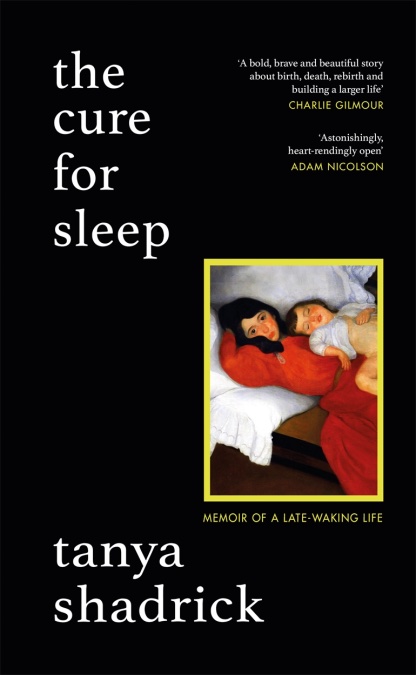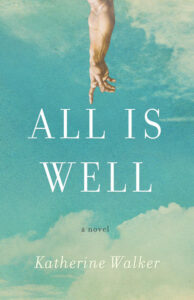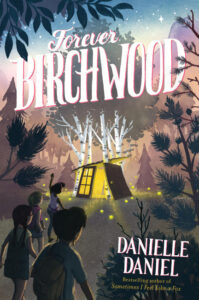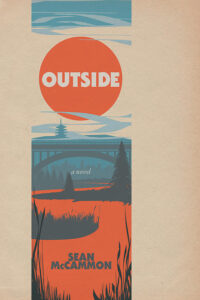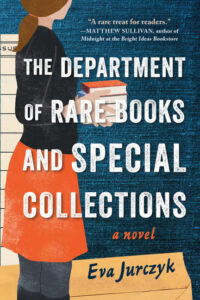March 7, 2022
The Swimmers, by Julie Otsuka
“Most days, at the pool, we are able to leave our troubles on land behind. Failed painters become elegant breaststrokers. Untenured professors slice, shark-like, through the water, with breathtaking speed. The newly divorced HR manager grabs a faded red Styrofoam board and kicks with impunity. The downsized ad man floats otter-like on his back as he stares up at the clouds on the painted pale blue ceiling, thinking, for the first time all day long, of nothing. Let it go. Worriers stop worrying. Bereaved widows cease to grieve. Out-of-work actors unable to get traction above ground glide effortlessly down the fast lane, in their element, at last. I’ve arrived! And for a brief interlude we are at home in the world. Bad moods lift, tics disappear, memories are reawakened, migraines dissolve, and slowly, slowly, the chatter in our minds begins to subside as stroke after stroke, length after length, we swim. And when we are finished with our laps we hoist ourselves up out of the pool, dripping and refreshed, are equilibrium restored, ready to face another day on land.” —The Swimmers, by Julie Otsuka
The most perfect encapsulation of a pool swim community I’ve ever encountered in a book. And then on page 77, the story shifts, becomes about one woman’s experience with dementia (and her daughter), and the pool is left behind, and how these pieces fit together is still something of an unsolved puzzle for me, but I am satisfied by the wondering so much.
March 1, 2022
Sorrow and Bliss, by Meg Mason
Meg Mason’s novel Sorrow and Bliss is as wide ranging as its title suggests, ostensibly the story of one woman’s experience over decades with an unspecified mental illness, which is to say that it’s also a novel about family, relationships, work, intergenerational trauma, growing, learning, falling, stopping. It’s about mothers and sisters, cousins and aunts, one particularly loathsome ex-husband, and pregnancy and motherhood, and medicine, and mental health, and about Martha’s marriage, to Patrick who has loved her since she was 14, a solid home that Martha has finally managed to burn down.
I loved this book, even though it was also a series of gut punches, so terrifically heartbreaking, but also wondrously funny, and Martha’s point of view is why we stick around as readers, and why those who love her have persisted for so long, so matter her propensity to be difficult. Except that point of view is so fixed that Martha can’t really see how others see her, and isn’t very perceptive of their situations either, in particularly her husband whom she’s never properly regarded as a fully developed character, but instead just another player in the drama of Martha’s life.
This is a novel that channels Woolf, and Didion, and Where’d You Go Bernadette?, but also manages to be itself in the most refreshingly original way. So breezy (this is Martha’s charm, see) that the reader can almost forget the emotional stakes of it all, which is so much, and therein lies the novel’s power.
February 25, 2022
The Sentence, by Louise Erdrich
“Even one person of a certain magnetism in this time can seize the energy and cause a maelstrom to form around each sentence they utter. One person can create a giant hurricane of unreality that feels like reality.
‘That’s what’s happening,’ she said. ‘Just look around.’
I didn’t have to. I felt like I could see everything—hatred valor, cruelty, mercy. It was all over the news and in the hospitals and all over me. Watching and waiting…had turned me inside out.”
I loved this extraordinary novel so completely, The Sentence a fiction made up of all kinds of pieces from the world, its characters including its author, Louise Erdrich herself, who flits in and out of the text, and with Birchbark Books, the independent bookshop Erdrich owns in Minneapolis, the backdrop for much of the story.
Set between November 2019 and November 2020, the novel’s protagonist is Tookie, an Indigenous woman struggling with returning to ordinary life after an incarceration, and who, on one of her shifts at Birchbark Books, is one of the first staff members to discern that the store is haunted by one very specific ghost, namely that of their most charmingly annoying customer, a white woman called Flora who had been an enthusiast for all things Indigenous.
As the trouble with Flora’s ghost escalates—she keeps knocking books onto the floor—much else is going on, of course—it’s 2020 after all. Tookie’s husband’s daughter—with whom Tookie has always had a fractious relationship—turns up with a newborn baby son. And then Louise takes off on a new book tour in mid-February, as news of a novel coronarvirus is becoming ever closer and closer to home, and I had such a visceral reaction to this part of the novel, back when everyone was wiping down surfaces and proceeding “out of an excess of caution.” Erdrich captures it so well, the looming dread, the incredible unknown, and the unfathomable way that time kept passing.
The bookshop closes to customers and Tookie and her colleagues find their work deemed “essential”, and so they spend their days socially distanced and packing up online orders, which arrive in surprising numbers. (Another visceral reaction for me was recalling that sad forever spring, and how wonderful and uplifting it was to have an order of books from local indies landing on our doorstep…) And Flora, or her ghost, at least, is still there, her presence becoming more urgent, beginning to seem dangerous.
But danger is everywhere after the death of George Floyd in Minneapolis that May, killed by police at the store where Tookie’s husband goes sometimes. The city erupts in rage and violence (the chapter is called “Minneapolis Goddamn”), explosive and uncontainable, and Tookie fears for her loved ones and for the future, her own impressions and experiences of police violence kept close to her chest, but here and there they burble to the surface and recall her own sentence in prison, and are complicated by the fact that her husband is a former officer. But still she feels with all those grieving Black mothers, and she knows the names of the men who’ve gone before, and she knows too that Indigenous people are just as likely to be murdered by the police, but you’re probably not going to hear about it, these crimes happening in more remote places where people aren’t happening by with cellphone cameras.
This book is everything. Comedy, tragedy, current events, recommended reading list (it’s so gloriously bookish!), ghost story, love story, a story of community, and also a harrowing tale of individual survival and resilience, and I just loved it so much, and it found it to be a comfort in the light of our own tumultuous moment, reminding me of all the things that really matter and the spectacular possibilities of books.
February 14, 2022
Free Love, by Tessa Hadley
Free Love was in the air—I’d heard about the book’s release in the UK, and anticipated a delay before it becoming available in Canada, but there it was, on sale February 1, and so I ordered it. Before the book arrived, another friend was already posting about it on Instagram with a rave review, and then the day I finally started reading, another friend sent along an email telling me that it was one of the best books they’d read lately and that I really must pick it up, and I do so love being told what to do when I’m doing it already.
Tessa Hadley is newish to me. I’ve read her novels The Past and Late in the Day in the last few years, and really enjoyed them, and have been looking for other copies of her books in bookshops ever since, but they’re not widely available here in Canada. It’s also true that while I enjoyed both books, they didn’t leave overwhelming impressions on me and I can’t remember much about either one except that they had atmosphere. And I think that’s actually the point.
Because Free Love too is an atmospheric novel, a book full of tension and interiority instead of wildly swinging plot. And even when the plot does swing with housewife Phyllis abandoning her suburban life to pursue a relationship with the bohemian son of a family friend, or even before that when fate conspires to bring this unlikely couple together in the first place, kissing beside a garden pond on the hunt for an errant sandal, the earth barely shakes and life continues on, seasons changing, floors requiring sweeping, dinners making. Everything is changed, but also nothing at all—but then about two thirds of the way through there comes a revelation that blows everything apart, and has me texting the friend who’s read it already “OMG I JUST GOT TO THE PLOT TWIST!”
But it’s not in fact the plot twist that matters at all really, instead the rhythms and patterns of daily life, both before and after, that Hadley manages to capture so beautifully, the way that life goes on, and on—if you’re lucky—no matter your choices. Every moment itself is a narrative leap.
February 7, 2022
The Cure For Sleep, by Tanya Shadrick
“How I began to spend my time that season would enlarge my life in a way I would only understand later, looking back. At the water’s edge that very first day when I stepped out from the hidden and habitual along with my clothes, I couldn’t know that even a middle-aged mother swimming laps in a small town can send ripples through the universe. But it did.”
Tanya Shadrick’s memoir The Cure For Sleep: Memoir of a Late-Waking Life is a story of becoming, of wonder, awe and possibility. It’s a story of life after death, of creative fulfillment after motherhood, of fierce determination, and the triumph of artistic expression and human connection. Triumph that comes against the odds, for Shadrick grew up accustomed to hiding on the margins, shy and uncomfortable with her place in the world, the working class daughter of a broken marriage, rejected by her father, growing up in the shadow of her mother’s difficult second marriage. Shadrick makes it out of her hometown, however, attending university, where she falls in love with a boy who’s as comfortable retired from society as she is, and they make a life together whose foundation is books and ideas, questions and conversation. And then soon after the birth of their first child, a medical emergency after complications, Shadrick comes as close to dying as one can while still being able to tell the tale, and a vision in this moment causes her to re-imagine her place in the world, to find a way to live more boldly and grow through connection with others.
Shadrick writes about early motherhood as an expedition in a way that delightfully recalls Maria Mutch’s memoir Know the Night, challenging notions of maternal instinct as these were feelings she had to conjure by practice. After having told the story of her “First Life,” she begins to live her second one differently, venturing out to meet other mothers and finding connection there, the inverse of such a tiresome cliche, and together these women support one another and find new ways to make a village. Shadrick eventually leaves the security of her administrative job at the university she attended to begin collecting stories of people living out their last days in hospices. She also starts swimming during the hours she can find for herself, which proves most inspiring, and she eventually becomes an artist in residence at the swimming pool, writing what she calls “laps of longhand.” All these experiences leading Shadrick to become known by a woman called Lynne Roper, whose notes and diaries, after Roper’s death, are edited into a volume called Wild Woman Swimming, longlisted for the Wainwright Book Prize in 2019.
How does one build a life? How does one become an artist?
(And most pressing: what does one wear for such an occasion? Shadrick would recommended a headscarf and an apron.)
If you’ve ever been a human, you’ll intuit that Shadrick’s path is not straightforward. That her success does not extinguish her pain and longing that resulted from her father’s rejection. That her long and beautiful marriage does not continue without the complication of Shadrick falling in love with somebody else. That achieving one’s goals does not always (or ever?) deliver happily ever after, and a wife, a woman, a mother, is forever becoming, which is the best possible outcome, even if it means that such a thing as satisfaction is always out of reach.
I ordered The Cure For Sleep from the UK after following Shadrick for some time on Instagram (swimming connections, I think) and coming to appreciate her artistic vision, and the memoir was everything I’d hoped it would be. Rich and literary, complex and thought-provoking, challenging and absorbing at once.
January 28, 2022
All Is Well, by Katherine Walker
The premise of Katherine Walker’s debut novel, All is Well, hooked me immediately: Christine Wright, former special forces agent and a recovering alcoholic, is settling into her near career as church minister when things go wrong and she ends up with a body to dispose of.
There’s a novel I’ve certainly never read before.
There’s also the sentient candlestick with ties back to Julian of Norwich, the excellent women who do the behind-the-scenes work at the church, the deranged vegan nurse with a daughter named after pate, the military policeman who’s intent on bringing Christine down, and all of Christine’s own demons resulting from childhood trauma and a military operation in which three members of her team were killed.
I loved this book, which is heartfelt and hilarious. A little bit screwball, and more than a little mystical, kicking at the margins of plausibility, but it works, it’s so novel, and so cleverly executed. No matter how determined Christine is to be at a remove, to not let anybody glimpse her vulnerability, Walker writes her character’s way right into the reader’s heart and the emotion is real, if everything else becomes something of a farce as the church community begins to grow and change, manifesting into something extraordinary under Christine’s tenure, in spite of all her attempts to stay under the radar.
No doubt this is a novel wholly imagined but informed by its author’s experiences in the Royal Canadian Navy and as a graduate student in divinity, which results in a really thoughtful foundation to this comic novel. This is one of those “fasten your seat-belt and hold on” novels, because it all moves pretty fast, but All is Well is also a book that’s rich in meaning, about trauma, and healing, and the possibilities of redemption.
Don’t miss it.
January 17, 2022
Forever Birchwood, by Danielle Daniel
I could not have loved Danielle Daniel’s Forever Birchwood any better, her middle grade debut following her success as an author/illustrator with picture books including the award-winning Sometimes I Feel Like a Fox. (Daniel also published a memoir The Dependent in 2016; her first novel for adults, Daughters of the Deer, is coming in March; Danielle Daniel is no slouch!).
Forever Birchwood is a dream of a book, the perfect pick for anybody who ever longed to start a babysitting club or is still thinking about Judy Blume’s Just as Long As We’re Together. A nice dose of nostalgia for those of us who grew up reading those books brand new, Daniel’s novel is set during the 1980s during the week of Wolf’s thirteenth birthday as she and her three best friends begin to contemplate the possibility of changes ahead. Wolf is also close to her grandmother, who educates her about her Indigenous ancestors’ ties to the natural world, which makes Wolf feel extra devastated at the prospect of Birchwood, her friends’ clubhouse and the nature around it, being torn down to make way for a new subdivision. Even worse, Wolf’s real-estate mom is pro-development and she and her new boyfriend Roger are spearheading the project.
The most delightful part of this story, which features all the hallmarks of middle grade goodness, is its specificity. Set in Sudbury, Ontario, where Daniel was born and raised, the story takes on the unique aspects of Sudbury’s culture and landscape. Wolf and her friends are passionate about Sudbury’s regreening plan, reforestation and clean-up to counter decades of industrial pollution, which makes their attachment to wild places and the trees and animals there so much more precious. Sudbury’s mining industry, obviously, plays a big role in their characters lives—Wolf keeps special possessions in her grandfather’s old miners’ lunchbox. Mining is dangerous, perilous work, but it’s also the foundation their town is built on.
I don’t read tons of middle grade fiction, but Forever Birchwood is the kind of title that makes me question why that is. The story and characters show emotional complexity, the story’s packed with emotional heft, and while part of the appeal was definitely nostalgia, this novel has a unique and creative richness that is entirely its own.
I’m going to be interviewing Danielle Daniel at her book launch this Saturday. If you’d like to join us and pick up a copy from Another Story Books (and you should!) registration and purchasing information can be found right here.
January 12, 2022
Outside, by Sean McCammon
I’ve learned to be wary of stories about white guys finding themselves in Japan, particularly as someone who has lived in Japan myself, because I’ve met those guys (yikes!), but Sean McCammon’s debut novel Outside was a smart and soulful take on those tropes.
The novel weaves two narratives: the story of David’s first year teaching elementary school, and his urge to take his class outside and into wild spaces, which eventually leads to a devastating tragedy; and the story of David’s escape to Kyoto in the aftermath, where he’s strung out on pharmaceuticals, suffering from PTSD, broken and lost, and finds refuge in the company of a group of other travellers and Japanese people who eventually become his friends.
It’s a quiet narrative, but the reader is compelled through the story by the ominousness of what David is running from and the desire to discover what happened.
Outside is a story about teaching, learning, responsibility, grief, connection and human goodness. I especially like how McCammon gets at the peculiarities of gaijin culture without resorting to tired cliches—a tricky balance.
I really liked this book.
January 7, 2022
The Department of Rare Books and Special Collections, by Eva Jurczyk
Eva Jurczyk’s debut novel The Department of Rare Book and Special Collection ticks all my boxes—bookish mystery, rare book thieves, library setting, weirdo librarian characters, Toronto setting, and intriguingly feminist. Curiously, Jurczyk arrived at the idea for her book and her protagonist Liesl after she became a parent and began pondering the invisibility of women, specifically older women…and then she went and wrote a novel about a woman who’s about sixty, which isn’t the usual trajectory for a new mom/novelist, is all I’m saying.
And so Liesl was not who I was expecting, especially based on the book’s otherwise quite compelling cover which might mislead a reader (and it certainly did me) into thinking I wasn’t picking up a book about a character with decades of backstory behind her, a story about a woman in a long marriage with a grown daughter, a woman on the verge of retirement with plans of finally writing that book about gardening she’s been thinking about all these years.
But then plans get called off when the Director of the Rare Books Library (which may or may not be influenced by the Thomas Fisher…) where Liesl works is incapacitated by a stroke, and she has to step into acting in his role. Which her colleagues are put out by, never mind the university president with his ubiquitious bike helmet and obsequious regard for major donors. All of which would be annoying enough, but then Liesl begins to realize that things at the library are not what they seem, that any number of her colleagues could be keeping secrets, and then one of those colleagues goes missing, but no one wants Liesl to involve the police.
The bookish mystery here is fun and interesting, though it’s Liesl’s own story that’s most remarkable and compelling about this book, and I admire the deft way in which Jurczyk sets her character just past midlife (don’t tell any baby boomers I wrote that…) and yet manages to develop a rich and textured backstory without awkward exposition. Liesl’s relationship with her husband John is my very favourite part of this book, such a deep and sensitive portrayal of a long and complicated relationship. John has struggled with depression over their years together, the reader is able to understand, and I kept waiting for this to become a plot point (and so does Leisl, actually, ever aware of how the bottom can fall out) but (SPOILER ALERT) it really doesn’t.
I don’t know that I’ve ever read a novel before in which loving somebody with mental illness is incidental to the story, but also it informs our understanding of Liesl, and her experiences with John in the past will inform the challenges she encounters at work where she feels like she’s been stymied at every turn.
The Department of Rare Books and Special Collections was my first book of 2022, and it started off my literary year on such a high note. Even better? On January 21 at 1pm, I’ll be interviewing Jurczyk for her virtual event with the Toronto Public Library. You can register here if you’d like to attend. I’m really looking forward to it.
January 6, 2022
What I read on my holidays…
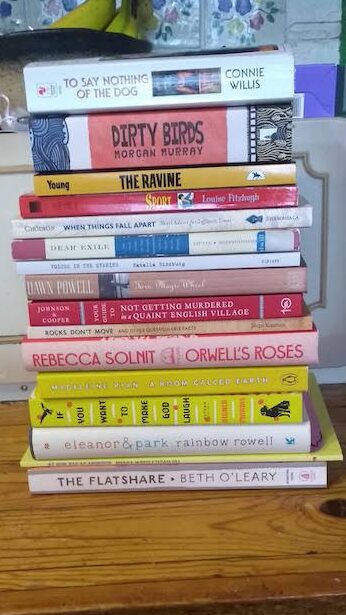
The end-of-year holidays is my very favourite reading period, when I shun new releases and top of the bestseller charts, and devote my time to smelly paperbacks I found in Little Free Libraries, novels I bought at used bookstores years ago with the best intentions but still haven’t read yet, and other books that have been sitting on my to-be-read shelf for far too long. It’s also the holiday where I’m not travelling, where my days are mostly full of hours to fill with reading (staying in bed for ages in the morning, reading all afternoon…) especially since it’s also the time of year where I mostly abandon the internet.
I love reading in the holidays because I get to finally make a dent in my epic to-be-read pile, to feel less overwhelmed by all the books before me and to get down to brass tacks. It was WONDERFUL.
Dear Exile, by Hilary Liftin and Kate Montgomery
I first read this book almost 20 years ago after stealing it from the youth hostel where I was living at the time, far across an ocean away from my own dear friends, including one that was named Kate. And so this story of two friends post-college on separate continents was very resonant, I recall. And then I mostly forgot about it…until I realized that my next novel, about two best friends, had definitely been informed by Dear Exile. And so I purchased a secondhand copy online and read it all again, and was bowled over by how extraordinarily good Liftin and Montgomery’s writing is. I don’t think anyone would ever publish that I sent my friends in a book. Also offers an extraordinary glimpse of late 90s dot.com work culture, whose tail end I had a sense of a few years later. A more innocent time. THE CYBERSEX!
*
When Things Fall Apart, by Pema Chodran
As I’ve written already, I rolled into the holidays in a mental health crisis, and so this title spoke to me when I encountered it on the shelves of the best store in the city. Definitely the book I needed in the moment—this book has showed me a glimpse of a world in which I don’t always need to be freaking out about what’s around the corner and instead just focussing on right now. Even if right now is hard.
*
Rocks Don’t Move, by Shari Kasman
Kasman and I have been sharing a swim lane on Mondays for a few months now (and we will again!), and after I read about her new book in The Toronto Star, I knew I had to have a copy. It was a remarkable book to read after When Things Fall Apart, actually, which its emphasis on subjectivity. What is a fact? What’s a feeling? An opinion? And what is community? This book grapples with these questions rather marvellously.
*
Sport, by Louise Fitzhugh
I either found this book in a Little Free Library or picked it up at a used bookstore this summer to add to my Louise Fitzhugh collection—and when it still felt like things were falling apart for me, to sit in my bathtub one Sunday night reading this while eating leftover fried chicken just felt like the greatest thing in the world.
*
Dirty Birds, by Morgan Murray
I met Murray in November when we both attended the Wordstock Sudbury Book Festival. Our hotel was as far away from the airport as was physically possible that weekend, and so we had lots of time to get to know each other in the airport van. Morgan Murray is notable for being a man who read my novel who is neither my relative nor a friend (though I might consider him one now—he’s wonderful). His debut novel was also nominated for the Leacock Prize and was such a delight to finally encounter. It has footnotes, AND cartoons. I really enjoyed it.
*
Voices in the Evenings, by Natalia Ginzburg
I’ve read a Natalia Ginzburg book over the past two winter holidays, and so was excited to read this one, which came out in English just this year. Truthfully, I loved it less than I’ve loved her other novels, but I loved them a lot, so that’s not saying much. She’s wonderful.
*
The Flatshare, by Beth O’Leary
I found this book in a Little Free Library this fall and knew I’d be looking for something light and cheerful. Like the Mhairi McFarlane book I read this summer, it was not as light as you think, but that’s probably why I liked it. Great character, some emotional complexity. Initially I was a bit suspicious that a novel about two flatmates who never meet would work…but it did!
*
The Ravine, by Phyllis Brett Young
Phyllis Brett Young’s The Torontonians is a beloved novel for me, and The Ravine is a noir novel she published under a pseudonym a few years later, reissued by Vehicule Press’s Ricochet Books with an introduction by Amy Lavender Harris, who was the whole reason I discovered The Torontonians in the first place. I really liked it—sinister, over the top, but with some interesting complexity and bit of a Shirley Jackson/Peyton Place England edge.
*
A Room Called Earth, by Madeleine Ryan
I spent a lot of early 2021 ordering books online from indie bookstores and this one was a title I threw into the order to make it worth my while. I read it on Christmas, which turned out to be perfect, because it was set at Christmas, albeit in Australia. Madeleine Ryan, who is autistic, writes about a character who herself is neurodiverse, though this is not made explicit in the text itself. Instead, the reader gets to see the world through the character’s unique perspective, which is extraordinary.
*
Your Guide to Not Getting Murdered in a Quaint English Village, by Maureen Johnson
I gave this book to my husband for Christmas, as we’ve spent a lot of time watching Midsomer Murders together over the years, and it proved a lot of fun. Our daughter also read it and related because she’s a fan of Johnson’s Truly Devious series.
*
Orwell’s Roses, by Rebecca Solnit
I received Orwell’s Roses as a Christmas present, the latest from Rebecca Solnit, who’s become well known for her pamphletty essay collections on politics and feminism, but whose larger literary projects (especially informed by her background as a geographer) were how I fell in love with her work in the first place. In this delightful meandering book, she reflects on a garden of roses Orwell planted at his home in Wallingford, Oxfordshire, and how this and other factors complicate common perceptions of the writer. Orwell continues to be fascinating for his critique of the USSR and authoritarianism all the while not becoming a right-wing nutjob in response, which was the usual trajectory.
*
Turn, Magic Wheel, by Dawn Powell
I bought this book at a used bookstore years ago, and have been failing to pick it up for years. Dawn Powell published this in the 1930s and her obscurity has been lamented by such forces as Fran Lebowitz and Rory Gilmour. It is exquisite, sharp and clever, full of edges and surprises.
*
Eleanor and Park, by Rainbow Rowell
Rowell’s Attachments was one of my favourite books of last year, and everyone told me that I had to read Eleanor and Park, which I think we found at Value Village. And I really liked it.
*
If You Want to Make God Laugh, by Bianca Marais
Also so happy to finally read this novel by Bianca Marais, whose podcast has been a big part of my year.
*
My Mom Had an Abortion, by Beezus Murphy
And then this book arrived in the mail, which I’d supported through its Kickstarter—it was so well done, telling such an ordinary story that doesn’t get addressed enough—how many of us only exist at all because of an abortion. It’s a graphic novel geared to teens and manages to address what’s simple and complicated about abortion all at once.
*
To Say Nothing of the Dog, by Connie Willis
And omg, this book, this book!! Be still, by Dorothy L Sayers/Barbara Pym/Jumble Sale loving heart, all wrapped up in a bonkers time travel plot. This novel was a gift and such a perfect novel to be reading as the new year began. (Grateful to Lindsay for the recommendation!)
